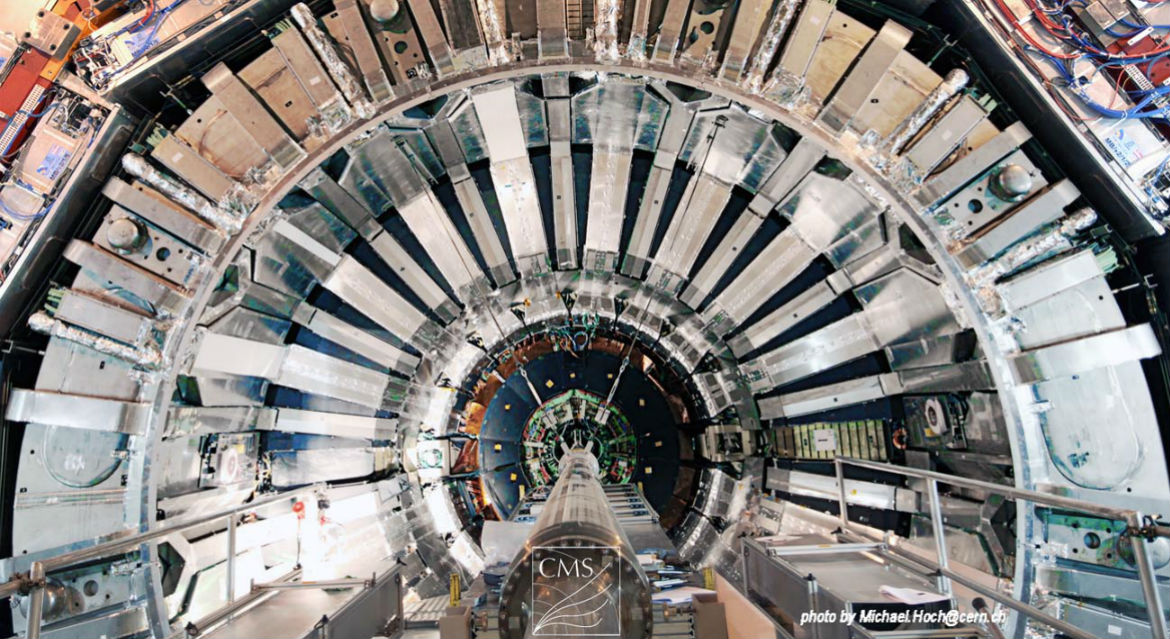Dundee to join CMS Collaboration at CERN
Published On Wed 10 Jan 2018 by Roddy Isles

The University of Dundee is to become a partner of the CMS Collaboration at CERN, the European Organisation for Nuclear Research.
The CMS is one of the four main experiments at the Large Hadron Collider at CERN and the CMS Collaboration brings together members of the scientific community from across the globe in a quest to advance humanity’s knowledge of the very basic laws of our universe. The CMS captures and measures data from the Large Hadron Collider, the world’s largest scientific experiment where recent breakthroughs have included the discovery of the Higgs boson particle, which has helped us understand the origins of mass.
Dundee is the first Scottish university to join the CMS Collaboration, and is one of only five UK institutions, joining Imperial College London, University of Bristol, Brunel University London, and the Science and Technology Facilities Council.
While most of the other UK partners involvement in the collaboration has a focus on high energy particle physics, Dundee doesn’t have a particle physics research programme. Its involvement is based around its expertise in materials engineering, mechanical engineering, civil engineering, and computing.
Professor Sir Pete Downes, Principal and Vice-Chancellor of the University of Dundee, said, “This is a significant recognition of our work at Dundee, particularly in applied sciences and engineering, and not only offers opportunities for our researchers to be involved with CERN but for our students as well.
“While particle physics lies at the heart of CERN’s activities, it is also one of the world’s leading centres of innovation in engineering, materials science, computing and data capture. I am delighted that Dundee is able to help drive forward that innovation.”
Mathias Kasemann, CMS Collaboration Board chairperson, said, “We are delighted to welcome the University of Dundee as an associated member institute in the CMS collaboration. Based on the strong expertise of the Dundee partners, several projects have been proposed with some already being taken up.”
The University of Dundee is engaged with CERN on a number of other projects, notably through work led by Professor Amin Abdolvand, Chair of Functional Materials & Photonics. The development of new processes and technologies could impact on the next major upgrade of the Large Hadron Collider at CERN, the so-called High-Luminosity Large Hadron Collider, which aims to increase the potential for discoveries after 2025, unlocking more of science’s greatest mysteries going back to the ‘Big Bang’.
Professor Robert Keatch, Head of Engineering and Applied Sciences, has been coordinating projects for undergraduate students in partnership with CMS, and two final-year Mechanical Engineering students have site visits planned for 2018 as part of their research.
The Compact Muon Solenoid experiment (CMS) is one of the two "general purpose" detectors situated on the Large Hadron Collider at CERN, the other being ATLAS. Occupying a cathedral-sized cavern under the ground near Cessy, France, and weighing in at around 12,500 tonnes, the CMS has been designed to probe the smallest constituents of matter in an effort to understand some of the most profound questions we can ask of nature. CMS is a general purpose detector designed to investigate a wide range of physics including supersymmetry, extra dimensions and particles that could make up dark matter.
The CMS Collaboration involves over 5000 particle physicists, engineers, technicians and students from around 200 institutes and universities from more than 40 countries.
(Image: © CERN, for the benefit of the CMS Collaboration)
For media enquiries contact:
Roddy Isles
Head of Corporate Communications
University of Dundee
Nethergate, Dundee, DD1 4HN
Tel: +44 (0)1382 384910
Mobile: 07800 581902
Email: r.isles@dundee.ac.uk